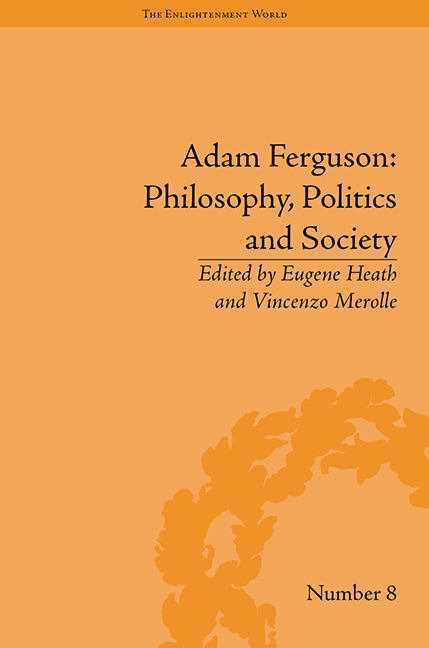8 - ‘But Art Itself is Natural to Man’: Ferguson and the Principle of Simultaneity
from IV - Society
Summary
One of the central characteristics of the social thought of the group of thinkers who collectively constitute the Scottish Enlightenment is their adoption of a stadial account of social development. This is usually labelled the ‘four stages theory’ though in fact explicit avowals in published work are not as common as might be supposed. Typically it is associated with Adam Smith (pre-eminently) but other names, such as those of John Millar, William Robertson and Lord Kames, are usually invoked. David Hume is acknowledged not to have subscribed to it explicitly, though passages in his Political Discourses (1752), in particular, betray clear recognition of step-changes in the history of commerce and the refinement of arts. Adam Ferguson is another whose relation to this theory is not straightforward.
A preliminary measure is to note that there are clear expressions in Ferguson's work of a stadial approach in its presumptively typical form. Two are worthy of note. One occurs in An Essay on the History of Civil Society where he appropriates, without acknowledgement, Baron de Montesquieu's division between savage and barbarian nations. Moreover, the difference between these ‘nations’ is made in terms of ‘property’ – savages are not acquainted with it, barbarians are albeit without formal legal form. In addition, in a manner typical of the four-stages version, savages are essentially hunter-gatherers, although some ‘rude agriculture’ may be practised (for Montesquieu the distinction was explicitly between chasseurs and pasteurs). Both savage and barbarian societies are labelled as ‘rude’ and thus can be contrasted with ‘civilised’. This latter more generic contrast is also stadial. Indeed, in the same context that he distinguishes savage and barbarian, Ferguson remarks that ‘property is a matter of progress’ and identifies as the ‘principal distinction in the advanced state of mechanic and commercial arts’ that there is a ‘habit’ formed of taking ‘a view to distant objects’. What this signifies, typical of the underlying psychology of the four-stages, is the necessity to separate property from possession to enable ‘industry’ to develop and to overcome the disposition of the ‘uncivilized’ to live indolently always in the present.
- Type
- Chapter
- Information
- Adam FergusonPhilosophy, Politics and Society, pp. 143 - 154Publisher: Pickering & ChattoFirst published in: 2014



